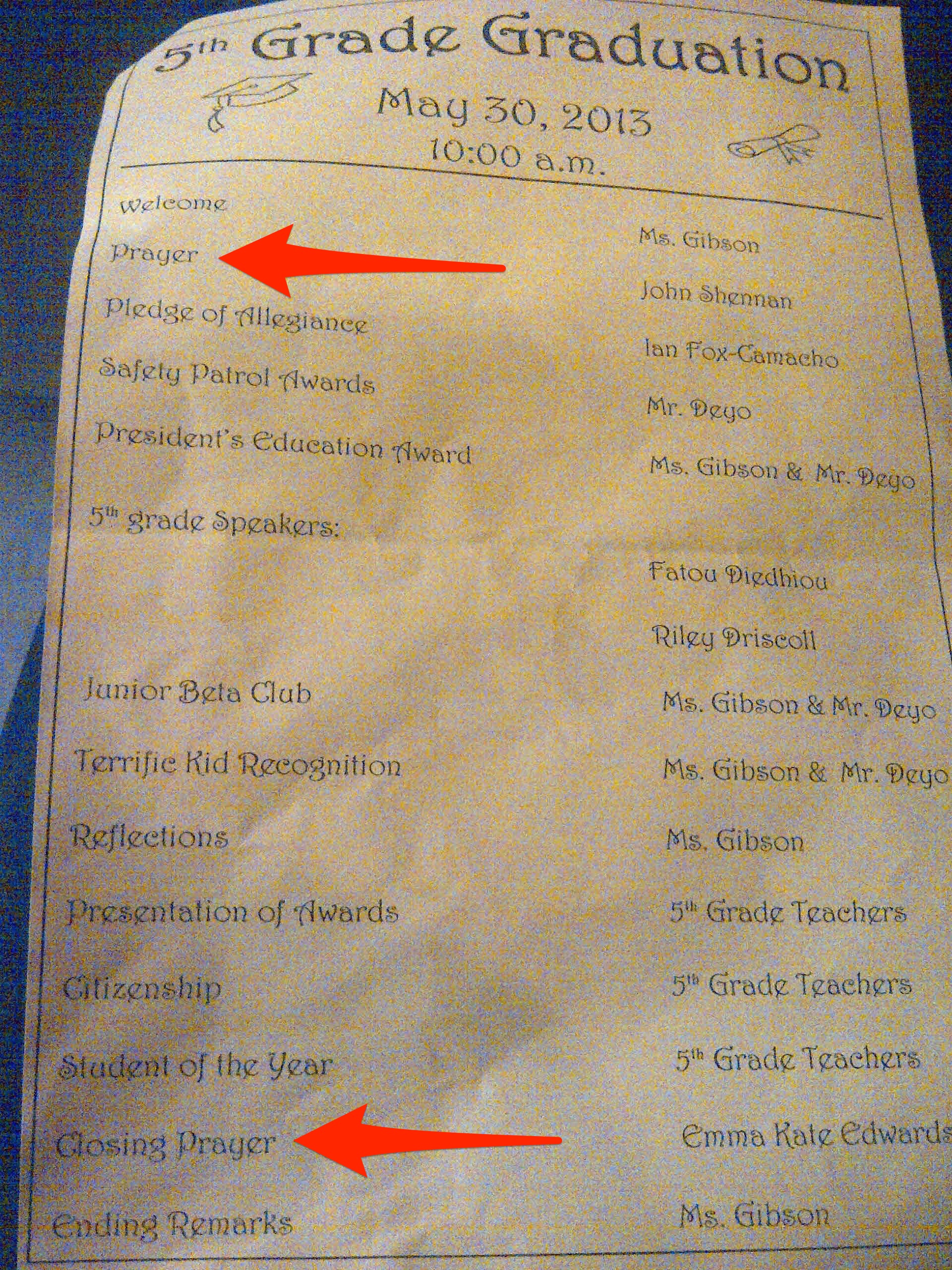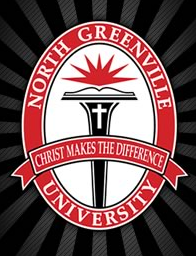More than three years ago, we learned that administrators at Mountain View Elementary School in Taylors, South Carolina held a “graduation” ceremony inside of a church.
Maybe they could’ve gotten away with that — other public schools have held ceremonies in similar places — but the event’s program didn’t even attempt to shy away from promoting Christianity, listing two separate prayers:

As I said back then, school officials didn’t just cross the line. They destroyed the line and then prayed to Jesus to patch it back up.
The American Humanist Association’s Appignani Humanist Legal Center sent the district a letter at the time warning them of the consequences of holding future ceremonies in the same location with these prayers.
The district responded immediately, but failed to say how they would change their plans for the future:
With regard to the prayers given at the program by students of Mountain View Elementary School, the District can assure you that the school will not endorse the use of prayer by students at any awards program or school-sponsored event in the future.
That’s legalese for “We won’t publicly admit that we support the prayers, but we’re not going to stop people from saying them.”
In fact, a school official asked a student to deliver the first prayer. And here’s what the closing prayer, also recited by a student, sounded like:
“Thank you for coming. Let us pray. Dear Lord, thank you for this day and all your many blessings upon us. Lord, bless each and every one of our teachers, leaders and parents. Lead, guide and direct us as we begin this new adventure into middle school. We give you the praise for all our accomplishments. In Jesus’ name I pray. Amen.”
Very Christian. Not okay at a public school graduation.
A second letter from the district even clarified that they weren’t going to stop these prayers in the future:
With regard to a student delivered a prayer or providing a religious message during a school-sponsored event, the District will not prohibit this practice as long as the prayer or message is student-led and initiated and does not create a disturbance to the event. Prohibiting such independent student speech would go beyond showing neutrality toward religion but instead demonstrate an impermissible hostility toward religion.
That sounds good… until you realize that the door was still open for administrators to ask students to speak (*wink wink nudge nudge*), knowing that the student population was overwhelmingly Christian and would pray on their own. Considering that these ceremonies were held inside of a church, that gave students even more reason to recite a prayer in their speeches. (Hell, that may be part of the reason those students are selected.)
So in September of 2013, the AHA filed a federal lawsuit on behalf of the family of a Mountain View Elementary student against the Greenville County School District, Superintendent Burke Royster, and Principal Jennifer Gibson. They claimed that the district violated the Establishment Clause through their actions.
“The federal courts have been clear that events like these violate the constitutional principle of separation of church and state,” said Monica Miller, an attorney and legal consultant with the Appignani Humanist Legal Center. “Any event sponsored by a public school must not violate that principle.”
They also pointed out the problem with the venue.
When there are alternative, acceptable spaces for an elementary school graduation readily available, there’s no reason to hold it in a church on a Christian campus with a motto like “Christ makes the difference” and a logo like this:

The ruling finally came down in May of 2015, with U.S. District Judge Bruce Howe Hendricks saying there was no evidence of anything illegal going on and that the District “ha[d] gotten it exactly right.”
… precisely because of the historical inclusion of prayer and religious speech at graduations, in this school district and State, it is conceivable that the cultural residue of prior practices might continue to color and confuse the application and invitation of, even now, constitutionally neutral practices. The undersigned is vigilant to identify any kind of wink and nod maneuvering.
But, the plaintiffs now have a serious kind of evidentiary problem…
The ruling said the AHA was right about the illegality of the prayer policy prior to 2013, but didn’t rule out prayers in future graduation ceremonies. Furthermore, the judge said the family filing the lawsuit didn’t have proper standing to bring the case. He didn’t say anything about the church venue for the ceremonies.
The AHA was very disappointed with the ruling:
“It’s a sad day when the courts allow students to be subjected to Christian prayers during what should be a secular graduation ceremony,” said Roy Speckhardt, executive director of the American Humanist Association. “These prayers exclude kids and families of minority faiths and no faith.”
…
“Federal courts have been unanimous in determining that prayers at public school graduations are unconstitutional,” said Monica Miller, an attorney with the Appignani Humanist Legal Center. “It’s alarming that the District Court upheld permitting Christian prayers to be delivered to impressionable young children in a Christian venue.”
In July, they filed an appeal:
“The Supreme Court and lower court cases make clear that graduation prayers violate the Establishment Clause, regardless of whether they are student-initiated, because they coerce students to participate in a religious exercise and are unavoidably stamped with the school’s seal of approval,” said Monica Miller, an attorney with the Appignani Humanist Legal Center.
The detailed argument explained how the judge got it wrong and how the Supreme Court has repeatedly ruled against district-sanctioned prayers at school events.
We now have a response from the Fourth Circuit Court of Appeals. The bad news is that this case isn’t over yet. But the good news is that this case isn’t over yet.
Here’s what the justices said:
1) The earlier ruling is vacated. That original ruling in which a judge said there was no evidence of anything illegal going on and that the District “ha[d] gotten it exactly right”? It means nothing anymore. That’s fantastic news since the lower court will have to decide it again (hopefully with a different judge).
2) Standing will have to be reassessed. Because the original students represented in the lawsuit have moved away, the District claimed the case shouldn’t move forward since it’s moot. However, the AHA said that it also represents other members whose children still attend the school. The Fourth Circuit therefore sent the case back to the lower court to decide if the AHA’s additional plaintiffs have legal standing. On that end, we’re kind of back to square one.
3) The lower court will have to rule on the merits of the chapel issue. The District Court never addressed whether it was okay to hold graduation ceremonies in a church. The Fourth Circuit now says the lower court will have to rule on that issue, no matter what.
So it’s not a victory. Not yet. But it’s another chance for the AHA to make its case because the earlier ruling against them no longer matters.
For that reason, as you can imagine, the AHA is thrilled:
“We are pleased that the Fourth Circuit is allowing our clients to vindicate their constitutional rights, and we will continue to defend them from government-sponsored religion and coerced participation in religious activity,” said Monica Miller, senior counsel at the Appignani Humanist Legal Center.
“The Fourth Circuit is giving the lower court the opportunity to uphold the Establishment Clause,” said Roy Speckhardt, executive director of the American Humanist Association. “Non-Christians students and families who want their public schools to remain neutral on religion deserve to have their day in court.”
We’ll keep following this story to see how it turns out.
(Large portions of this article were published earlier)



It’s Moving Day for the Friendly ..."
It’s Moving Day for the Friendly ..."
It’s Moving Day for the Friendly ..."
It’s Moving Day for the Friendly ..."